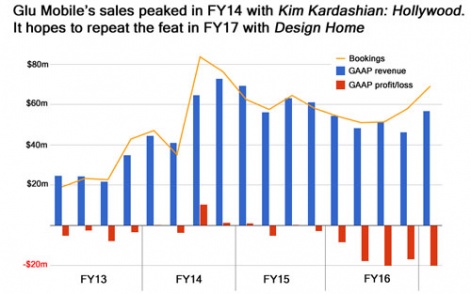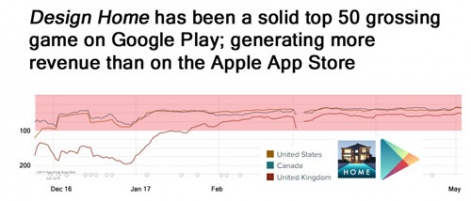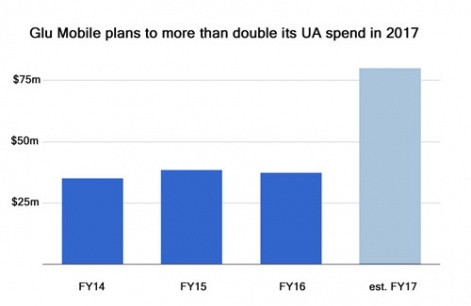Glu Mobile’s FY17 Q1 financials provided something for optimists and pessimists.
GAAP revenue was up 23 percent quarter-on-quarter, while bookings (GAAP revenue plus deferred revenue) beat the top end of Glu’s guidance by 28%.
Indeed, thanks to the success of new game Design Home, Glu bullishly increased its prediction for full year bookings from between $215 million - $225 million to $280 - $290 million.
If it can deliver this, it would take Glu to the heights of FY15 when the initial success of Kim Kardashian: Hollywood delivered $280 million in trailing 12 month bookings.
Back then, Glu was even mildly profitable. No wonder Glu bulls are all fired up.
Or half empty?
Yet, there’s plenty of ammunition for pessimists too.
Despite the sales jump, costs were also up and Glu made an all-time record quarterly loss of $23 million.
Royalty payments - mainly on ill-performing legacy celebrity games - remain a burden. It still has at least $12 million of these minimum guarantee payments owing. In addition, Glu’s cash total dropped by $29 million to $73 million as it spent to fund day-to-day operations.

And even if it hits its new FY17 revenue total, the company will still be loss-making, not that this would be a surprise.
Glu has been loss-making for six successive quarters.
The road ahead
More significant than arguments over numbers, however, are signs Glu Mobile now has a strategy.
As previously stated by new CEO Nick Earl, the company’s long-term success is dependent on instilling a new sense of creativity when it comes to mobile game development.
Reinforced by new high level hires, such as ex-EA exec Mike Olsen, and relocation to a new building in San Francisco later in 2017, this is expected to drive sales growth in 2018 as new titles are released.
In the meantime, though, meeting FY17’s new targets will be down to making the biggest success possible of new game Design Home.
One of two games acquired when Glu bought US developer Crowdstar in late 2016, Design Home was its star performer in Q1, delivering $14.9 million in bookings. This was up from $4 million for the two-months Glu booked within its FY16 Q4 quarter.
An interior designer sim with strong social elements, the game’s success - it’s currently a top 50 grossing game on iOS and top 40 on Android - seems to have taken Glu by surprise. For example, it’s one of Glu’s few games that performs better on Android than iOS and no-one seems to know why.

But now it’s full-speed ahead to ensure Glu makes the most of the opportunity. Indeed one of the reasons Q1 costs were higher was because it started aggressive user acquisition for the title.
Historically, Glu hasn’t been a big spender when it comes to marketing, typically spending around $10 million a quarter, or 16% of bookings. During the past three months that’s risen to over $14 million and Glu plans to massively increase this over the coming months.
“We believe Design Home is in a unique place in its lifecycle where user acquisition will benefit bookings growth this year and next year,” explained COO Eric Ludwig in an analysts’ call.
And that’s the reason Glu has earmarked $30 million of additional UA spend compared to Q1; which could see its annual marketing budget hit $80 million.
Open door policy
Of course, there are risks to this strategy.
Glu could spend large amounts of cash gaining installs that don’t result in revenue.
Key to this is the ability to track exactly where you’re spending your UA money and then seeing how quickly those users are spending. In this way, optimising spending on the best channels - for Design Home, Instagram and Pinterest would be obvious candidates - should result in the best return on investment.

Yet, given its financial situation, perhaps the worst case scenario for Glu would be if it couldn’t find enough quality channels (and users) to spend its marketing budget on.
The bottomline is it believes Design Home is a money-making machine. Now it needs to get more people playing it.
As Eric Ludwig puts it, ‘it’s a magical opportunity’.






















